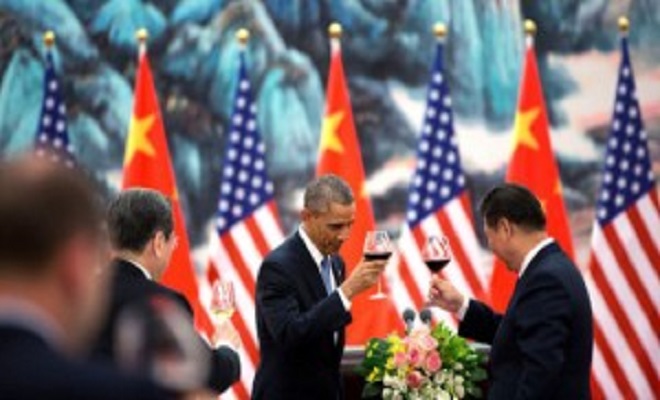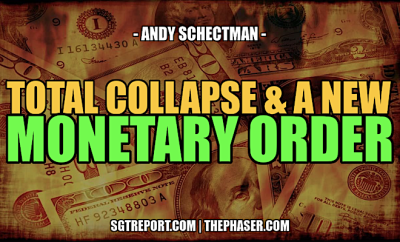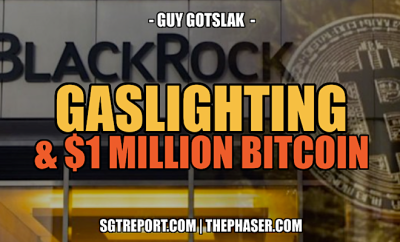 NEO.org
NEO.org
Economy
AIIB, BRICS Development Bank and an Emerging World
by , NEO.org:
Germany is a founding member as France. So is Luxemburg, even Great Britain. Putin’s Russia and India are also among the founders. To the surprise of many, so is the International Monetary Fund (IMF), an institution that until now has been a pillar of the dollar system. We are talking about China’s Asian Infrastructure Investment Bank or AIIB. The question is whether the AIIB is on its way to become the seed crystal of a new monetary order that could replace the destructive influence of the dollar? Or will it be infected by Trojans like the UK and the IMF? The answer could well shape the architecture of a new world in which the dollar and its bloated debt structures no longer dictate to the entire world what their economic policies shall be.
In October 2014, China announced it was creating a new international bank to finance major infrastructure projects across Asia. The prime driver for China was to finance their New Silk Road high-speed Eurasian rail and also sea infrastructure projects and the refusal of the United States to agree to major IMF voting reform that would give China and other emerging economic nations more say. Beijing announced they will give $50 billion to start the new bank. At the time, Washington and most of the rest of the world ignored the bank, while the Obama Administration attacked the AIIB for possibly lacking transparency or sufficient concern for environmental risks, patent diversions from the reality, namely, that the AIIB represents a strategic threat to continued American global dollar hegemony.
Washington’s well-aimed shot in the foot
The Obama Administration, by fiercely opposing it when the UK, Australia, Japan and other core US allies indicated interest in joining the AIIB, now have royally shot themselves in both feet. Today, as of the March 31 deadline, more than 40 nations have joined with China’s new banks as Founding Members. The bank now threatens to rival the IMF, World Bank and the related Asian Development Bank as a long-term creditor able to attract capital to major infrastructure investment across Eurasia and perhaps beyond. Those three public banks are all derived from the US’ postwar Bretton Woods Treaty and all three are controlled tightly by Washington to the advantage of the dollar and of US interests.
Now it’s not as if China is sneaking behind the back of their dear friends in Washington. In 2010 China, Brazil and other fast-developing countries won an agreement on reform of the IMF that would have doubled the funds available to the IMF in return for a greater voting weight for countries such as China, Russia, India and Brazil and other economies which were not even on the map in 1944 in terms of relative economic size. The proposal won 77% of the share votes of all IMF member countries.
The 2010 IMF voting rights reform stipulated that China will become the 3rd largest member country in the IMF, and there will be four emerging economies—Brazil, China, India, and Russia—among the 10 largest shareholders in the Fund. Under present rules, Washington, conveniently holds 16.75%, a veto minority. Close US geopolitical allies—Japan with 6.23%, UK and France each with 4.29% and Germany with 5.81% would typically insure that IMF policies in any area were “friendly” to American defined national interests.
China, Russia, India, Brazil and other fast-emerging economies find it is manifestly absurd that today IMF voting rights on the Executive Board give France, with a $3 trillion GDP, far more votes than China with a 2014 GDP of more than three times that, at $10 trillion, or gives Belgium (1.86%) with a $500 billion GDP a larger voting share than Brazil (1.72%) with a GDP more than four times as large at $2.2 trillion. According to the IMF bylaws, a member country’s voting shares ought to be roughly proportional to its relative size among the 147 IMF member countries in terms of GDP. When Washington drew up the IMF bylaws in 1944 it stipulated, conveniently, that no major decision of the IMF could come into force unless it had 85% of all member voting shares supporting it.
Washington is holding on like a pit bull to the old bylaws in which the US retains a blocking veto share of votes. The US Congress refuses to pass the IMF reforms and to break the impasse. This is a major way forced China and the other fast-growing BRICS states to look outside the IMF and World Bank and build an entirely new architecture. The AIIB today is emerging rapidly as a centerpiece in this emerging new global architecture.
Rather than trying to influence the new AIIB from within, Washington has chosen a tactic that has delivered it a huge and humiliating geopolitical defeat, and which will likely exclude US corporations from lucrative construction bids.
US foreign policy under Obama, as it was under George W. Bush, is being run by a gaggle of neo-conservative ideologues who seem incapable of flexible response. For them anything China does is “bad” and must be opposed with all US might.
China for those Washington people is the emerging global challenger to US military power, so Obama imposes an “Asia Pivot” military strategy to encircle and anger Beijing. China’s economic and financial influence threatens the dollar system so that too must be opposed. The BRICS threatens to become independent of Washington control as vassal states, so BRICS states must be “taught a lesson” as Washington recently attempted with its usual Color Revolution organized opposition protests against pro-BRICS president Dilma Rousseff in hopes of installing a US-friendly free market alternative.
The problem for Washington is that none of this is working as it used to. And Washington sees the desertion of her closest “allies” to join China’s AIIB. One is reminded of the statement by England’s Prime Minister Lord Palmerston, “England has no friends, merely her interests.”
The new architecture emerging
Not only are Russia, Brazil, India, in the AIIB founders list—four of the five BRICS—as well Australia, New Zealand, Indonesia, Pakistan, Philippines, Vietnam—countries the Obama Administration is relying on to join the military Asia Pivot against China, have all decided to join with China in her new bank. Even Taiwan has applied to join under the name Chinese Taipei.
And in a further devastating for the image of Washington and perhaps for the future of its domination of the IMF and World Bank, was the fact that five of the Group of Seven large western industrial countries—Italy, France, Germany, UK and even Japan looks likely to join. In all more than forty nations have applied to become founding members.
“Money talks and nobody walks,” as the crazy radio jingle during the 1960’s aired by Rock ‘n Roll DJ Charlie Greer on the popular WABC Top 40 New York radio station, on behalf of Dennison’s Clothing Store put it. China has the money, and nobody, except the USA, is walking away from that it seems.
The rush to get in on the China-backed Asian Infrastructure Investment Bank by all these countries including the largest EU members is the realization that Asia and Eurasia is where the economic future of the planet will be made or broken. The USA and Canadian economies are choking in unpayable debts, rotting infrastructure and rustbelt industrial ghost towns like Detroit or Pittsburgh. America is no longer the magnet that all others are drawn to for trade. The country is bust, its government economic figures a bodyguard of lies, its true unemployment at Great Depression levels of 23.2% according to John Williams’ Shadow Government Statistics.
China is in a pivotal position to found such a new bank to finance transnational large infrastructure such as the New Silk Road trans-Eurasian high-speed railway that Russia is in the process of connecting with. There will emerge large demand for construction of infrastructure in terms of electric power facilities, highways across Eurasia and Asia. Economic infrastructure is on the drawing boards ultimately linking South Korea to the vast Chinese economy via North Korea.
The infrastructure gap across Asia and Eurasia is enough to spur global industrial growth for decades. The Asian Development Bank (ADB) estimates Asia will need $8 trillion over the next decade for energy, transportation, telecommunication and water/sanitation. Now private investment in infrastructure runs a mere $13 billion a year, most in low-risk projects. Official development assistance adds another $11 billion a year. That means a shortfall exceeding $700 billion a year.
By refusing to join and trying to stop the AIIB Washington in effect stands opposed to Asian regional investments that will expand trade, support financial market development and macroeconomic stability, and improve environmental, health and social conditions. Instead all Washington has to offer is the silly Trans-Pacific Partnership for US-friendly free trade deals that would allow Monsanto and other US corporations to override Asian national laws in pursuit of profit.
The very fact that the AIIB has gathered such worldwide support is demonstration of the impotence of the US-dominated Bretton Woods institutions of the World Bank, IMF and Asian Development Bank.
And a new BRICS Bank
The Asian Infrastructure Investment Bank is but one new initiative by the world’s emerging economies.
At the 2014 BRICS summit in Fortaleza, Brazil, they five heads of state declared bluntly, “We remain disappointed and seriously concerned with the current non-implementation of the 2010 International Monetary Fund reforms, which negatively impacts on the IMF’s legitimacy, credibility and effectiveness.” Collectively, BRICS account for nearly $16 trillion in GDP and 40% of the world’s population, nothing to be lightly disregarded as a group of banana republics as some policymakers in Washington evidently still see them. They haven’t had their eyes checked since 1944 apparently.
The New Development Bank as it is formally called, or informally the BRICS Development Bank will be headquartered in Shanghai, China’s fast-emerging world financial hub. It will open for business with a $100 billion dollar liquidity reserve to defend against possible currency wars as Washington and Wall Street launched in 1997 to destroy the then-booming Asian Tiger economies led by South Korea, Malaysia and Indonesia. The New Bank will also have an initial $50 billion in capital, each BRICS country contributing $10 billion, with the agreed option to rise to $100 billion for financing BRICS infrastructure projects.
The NDB charter specified its membership will be open to all United Nations member states. However, and this is crucial, the five founding BRICS capital share must never fall below 55 percent, and a non-founding member may never increase above 7 percent. In short The BRICS bank will be managed by governments who share deep dissatisfaction with the Washington-controlled Bretton-Woods institutions.
The combination of the two new infrastructure banks poses the greatest threat to the US dollar system and its control of world financial flows since 1944.iv It is this threat that is driving the rudderless foreign policy agenda of Washington. Peace and cooperation is a far more useful way to resolve affairs among civilized nations.

















